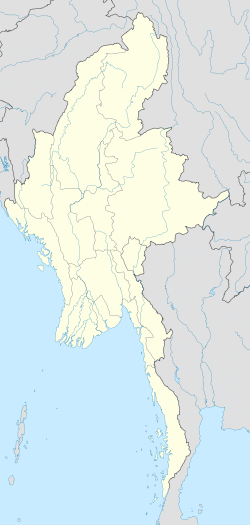Hpakant
|
Hpakant ဖားကန့် |
|
|---|---|
| Location in Burma | |
| Coordinates: 25°37′0″N 96°19′0″E / 25.61667°N 96.31667°ECoordinates: 25°37′0″N 96°19′0″E / 25.61667°N 96.31667°E | |
| Country |
|
| Division | Kachin State |
| District | Myitkyina District |
| Township | Hpakant Township |
| Population (2014) | |
| • City | 312,278 |
| • Urban | 60,123 |
| • Rural | 252,155 |
| • Religions | Buddhism, Christianity |
| Time zone | MST (UTC+6.30) |
Hpakant (Burmese: ဖားကန့်; also Hpakan and Farkent), is a town in Hpakant Township, Kachin State of the northernmost part of the Union of Myanmar. It is located on the Uyu River 350 km north of Mandalay in the middle of one of the world's most inhospitable and malaria infested jungles, cut off for several months a year during the monsoons. It is famous for its jade mines which produce the world's best quality jadeite.
In 2011 fighting broke out between the Kachin Independence Army and the Burmese Army in the area around the Hpakant jade mines displacing an estimated 90,000 people by September, 2012 and killing hundreds of people.
Located 48 miles from Mogaung, Hpakant.
Like an old mining town of the American West, Hpakant has been dubbed "the wild wild east" replete with alcohol, gambling, prostitution, and opium dens. Since after the Kachin Independence Army (KIA) came into the area before negotiating a cease-fire agreement with Burma's military government in the early 1990s, heroin is no longer openly on sale on the streets of Hpakant. Both addicts and drug dealers were rounded up, taken to the nearby Uru River, shot and dumped in the river.
Concerns have been expressed regarding the encroachment on and destruction of the environment from deforestation and landslides resulting from mining activities and consequent flooding. The Uru River has also been affected by the dumping of soil. There have been instances of locals being forced to leave their homes when upland areas were bulldozed by the big mining companies.
...
Wikipedia

